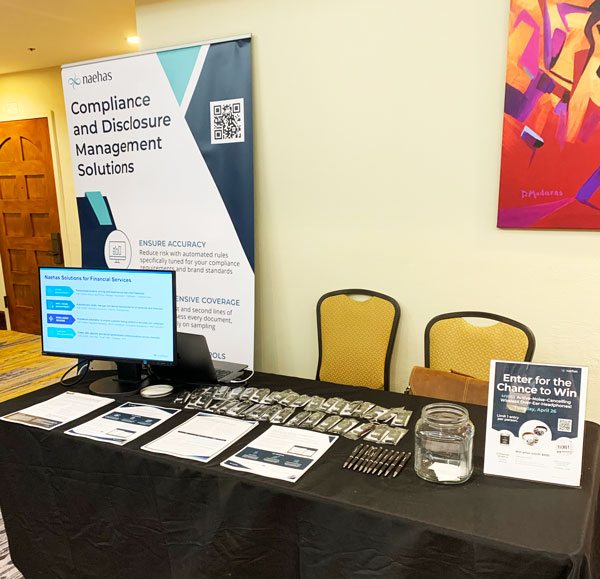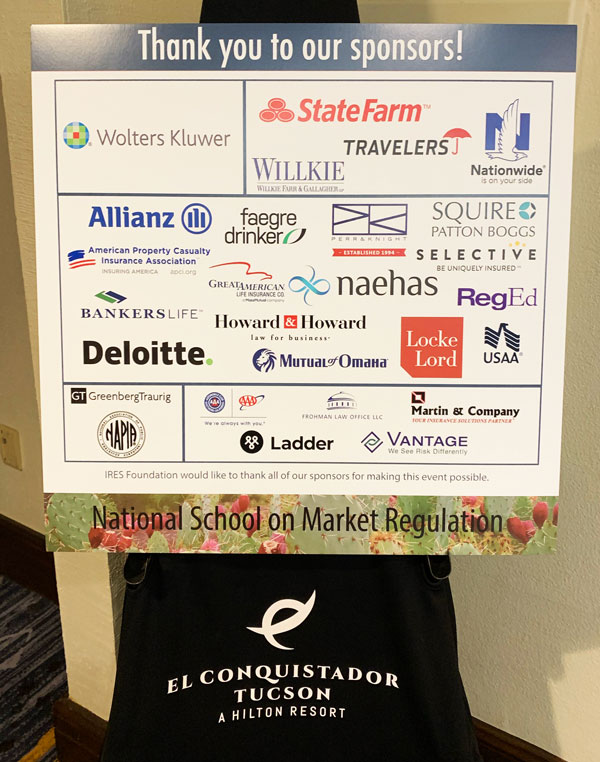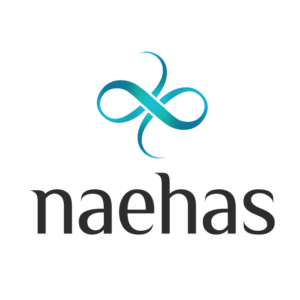For over 25 years the IRES Foundation, a non-profit which supports the Insurance Regulatory Examiners Society (IRES) has operated an important educational event. The National School on Market Regulation brings insurance compliance professionals together with industry to support greater compliance cooperation and added value for the consumer. It did just that in April, drawing regulators, providers and vendors together for a valuable 3-day industry event.

The information-packed and insightful program opened with a Commissioner’s Forum. The Forum was moderated by Fred Karlinsky, co-chair of the global law firm Greenberg Traurig’s Insurance Regulatory and Transactions Practice Group. State Insurance Commissioners shared news and insights into the most pressing issues and challenges facing the industry today, such as:
- Long Term Solvency
- Consumer Confidence and Education
- Consumer Understanding of what they are actually buying
- Coverage Gaps
- The Talent Gap and need for younger people to join the industry
- AI tools and importance of greater understanding of them
- Cybersecurity as a threat to companies and consumer confidence
Keen Insights from Commissioners
Better understanding the work of the Commissioners whose leadership with the NAIC is core to the industry, details on the work of specific committees is shared here to expand awareness of, and appreciation for, the time and commitment to key issues. So it seems wholly appropriate to offer a quick summary of NAIC.

The National Association of Insurance Commissioners (NAIC) provides expertise, data, and analysis for insurance commissioners to effectively regulate the industry and protect consumers. Founded in 1871, the U.S. standard-setting organization is governed by the chief insurance regulators from the 50 states, the District of Columbia, and five U.S. territories to coordinate regulation of multistate insurers.
Regulator Roundtable Highlights
Evan Daniels, Director of Arizona’s Department of Insurance and Financial Institutions kicked off the panel discussion, and announced the formation of a new NAIC Committee. The H Committee’s primary function is to bring about innovations in the industry. It establishes a working group where community members can exchange ideas and best practices and provides regulators the opportunity to see some of the newer innovations in practice. This also ensures regulators can stay up to speed on emerging developments.
As detailed by the NAIC, the mission of the Innovation, Cybersecurity, and Technology (H) Committee is to:
- Provide a forum for state insurance regulators to learn and have discussions regarding: cybersecurity, innovation, data security and privacy protections, and emerging technology issues.
- Monitor developments in these areas that affect the state insurance regulatory framework.
- Maintain an understanding of evolving practices and use of innovation technologies by insurers and producers in respective lines of business.
- Coordinate NAIC efforts regarding innovation, cybersecurity and privacy, and technology across other committees.
- Make recommendations and develop regulatory, statutory or guidance updates, as appropriate.
Andrew Mais, Vice President of NAIC and Connecticut’s Insurance Commissioner spoke about climate change in relation to the need for innovation due to the known threats in the coastal region and the policies written to cover them. Then he pivoted to using technology to try and ensure products are being offered in all regions and are done so in a fair way. This would drive consumer confidence in the promises made to them by the industry. He further noted that technology could be used to drive ethics through Artificial Intelligence (AI).
Delaware’s Insurance Commissioner, Trinidad Navarro, moved the conversation into the relationships between providers and regulators. He emphasized the importance of transparency and good working relations with the regulators, telling the audience that they were not there to stand in their way and would not do so if providers acted accordingly. His example was changes to Medicare advantage plans and the thousands of violations they saw resulting in a $1.2M fine.
Chlora Lindley-Myers, Missouri Department of Commerce and Insurance Director; current President-Elect of NAIC, continued the Market Conduct theme with her time. Everything done affects all of us, she told the group. She highlighted some coverage area gaps related to climate change and asked for help from carriers in covering earthquake-prone regions in the center of her state.
Barbara Richardson, Commissioner, Nevada Division of Insurance, spoke about big changes coming to Worker Comp protections. The law must fit the market, she told providers. She expressed concern over AI’s potential to discriminate from errors in their algorithms and the need for pre-disaster mitigation tools.
 Attendees at this panel also heard from Scott White, Virginia’s Insurance Commissioner, who is also Chair of the NAIC’s E Committee on Financial Conditions, among other leadership roles. The mission of the Financial Condition (E) Committee is to be the central forum and coordinator of solvency-related considerations of the NAIC relating to accounting practices and procedures; blanks; valuation of securities; financial analysis and solvency; multistate examinations and examiner and analysis training; and issues concerning insurer insolvencies and insolvency guarantees. In addition, the Committee interacts with the technical task forces. In addition to an overview of the Committee’s technical focus, White expressed concerns about private equity and its investment in the “search for yield,” with a warning that this may drive risky behavior.
Attendees at this panel also heard from Scott White, Virginia’s Insurance Commissioner, who is also Chair of the NAIC’s E Committee on Financial Conditions, among other leadership roles. The mission of the Financial Condition (E) Committee is to be the central forum and coordinator of solvency-related considerations of the NAIC relating to accounting practices and procedures; blanks; valuation of securities; financial analysis and solvency; multistate examinations and examiner and analysis training; and issues concerning insurer insolvencies and insolvency guarantees. In addition, the Committee interacts with the technical task forces. In addition to an overview of the Committee’s technical focus, White expressed concerns about private equity and its investment in the “search for yield,” with a warning that this may drive risky behavior.
Industry Issues Addressed in Event Sessions
While so many important issues and challenges were addressed during the 3-day event, here is a summary of several break-out sessions of particular relevance to regulatory compliance, Software as a Service (SaaS) technology like that which Naehas provides to the insurance industry, and emerging problems and solutions, such as cybersecurity and Artificial Intelligence (AI), respectively, which are gaining attention from insurers and regulators alike.
Accelerated Underwriting and Artificial Intelligence (AI)
It was noted that the NAIC has been coordinating an effort to review both Accelerated Underwriting and Artificial Intelligence (AI) from a national perspective. In this session, we heard from regulators about their latest work at the national level and in their respective states. Included on the panel were: Matthew Gendron, General Counsel & Chief of Regulatory Compliance at Rhode Island Department of Business Regulation Financial Services; Matt Tarpley Chief Market Conduct Examiner with the Texas Department of Insurance; and Cheryl Davis, AVP, Corporate Compliance-Market Conduct at Nationwide Insurance.
The session discussion focused on the need to guard against market conduct violations by understanding the intelligence behind AI solutions. Transparency with regulators was noted as important to this process, with concern expressed that the technology can potentially exclude or discriminate because of faulty algorithms. To this end, it was noted that AI assessments should be viewed with careful attention to ensure there is no lack of context and no bias. Essentially, if an insurer cannot explain why a claim was denied, then the company should not be using the technology. Clearly, there is much room for enhanced awareness of the potential for AI solutions to be helpful to the industry, which is critical to efficiency, accuracy, compliance, customer service and industry growth moving forward.

Insurtech Marketing
Understanding risks and how to mitigate them was the primary focus of this insightful session. As IRESF noted in their introduction of this emerging sector, “New distribution and marketing methods for insurance bump up against old regulatory issues like lead generation, referral programs, licensing, and compensation for unlicensed persons. “
Addressing this issue was a stellar panel of industry experts: Cara St. Martin Vice President of Compliance at Ladder Insurance; Sue Stead Of Counsel, Squire Patton Boggs; Kathleen Sturgeon, Deputy General Counsel, Markel; and Leatrice Geckler, Compliance Division Director with the State of New Mexico Office of the Superintendent of Insurance.
St. Martin opened the session by addressing the importance of these firms to build out compliance teams, identify specific roles and shoring up staffing. The importance of developing ways to review regulated content, advertisements, was understandably a top priority. She noted that this represents a great opportunity, but that carriers must be willing to do things differently with regard to marketing, demos and products. The panelists weighed in on related areas of concern and priority, including taking distribution to the next level. Notably, making sure the products meet legal and compliance standards and ensuring that there is adequate documentation was seen as key. With a primary focus on the need for regulated content, such as all insurance ads, to be reviewed for compliance, it was clear that vendors who can deliver solutions in the marketplace will be regarded as valuable collaborators and solution providers for insurance providers and regulations alike.
 In addressing areas of concern with insurtech firms, Markel’s General Council, Kitty Sturgeon, urged carriers to put language into the agreement, to ensure that the Insuratech is contractually obligated to review advertising if they use the carrier’s name. She recommended using SLAs in the contracts to ensure adherence, make them have teeth. Knowing what reporting is required, who handles the complaints, and having contacts in all involved departments are all important.
In addressing areas of concern with insurtech firms, Markel’s General Council, Kitty Sturgeon, urged carriers to put language into the agreement, to ensure that the Insuratech is contractually obligated to review advertising if they use the carrier’s name. She recommended using SLAs in the contracts to ensure adherence, make them have teeth. Knowing what reporting is required, who handles the complaints, and having contacts in all involved departments are all important.
Valuable insights were offered by New Mexico’s Office of the Superintendent of Insurance Compliance Division Director, Leatrice Geckler. A few noteworthy comments are summarized here:
- Build a trusting relationship with your regulators.
- It’s not a regulator’s job to run your business, so don’t expect us not to refer you to the statutes.
- After you review them, please do call us.
- There is a lot of deceptive advertising in the marketplace.
- Surplus line obligations must be addressed; these must come from the broker and cannot come from the carrier.
Lastly, the issue of online selling was brought up, noting that rules were written for an analogue world. There are no agents, paper applications, or survival values in play. The bottom line: there is a great need to educate business partners on what is needed.






